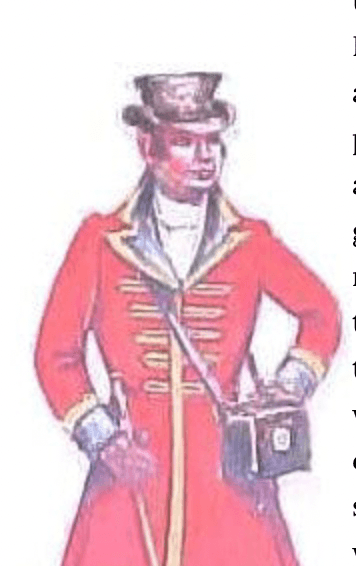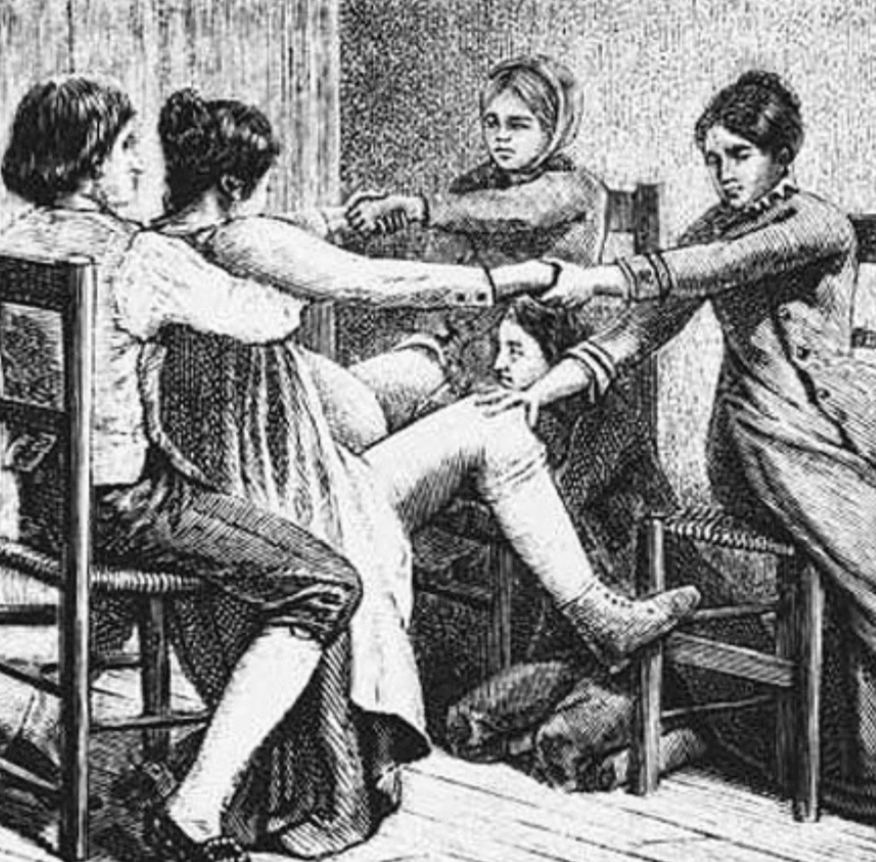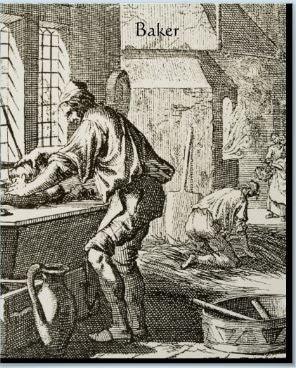
The Mail Guard
nor heat nor gloom of night stays these couriers from the swift completion of their appointed rounds
Starting in 1784, letters sent by Royal Mail traveled by Mail Coach. These were special stagecoaches that carried few or no passengers and were specially guarded. Averaging a speed of eleven miles an hour, they were a great deal faster than other coaches.  The Mail guard wore the Royal livery consisting of a scarlet coat trimmed with gold braid. He was also provided with a blunderbuss, a clock kept in a leather pouch, a horse pistol, and a horn with which to warn other road users as well as to announce the arrival and departure of the coach. The duties of the mail guard, an employee of the post office, were the delivery and safety of the mail and keeping the coachman on time.
The Mail guard wore the Royal livery consisting of a scarlet coat trimmed with gold braid. He was also provided with a blunderbuss, a clock kept in a leather pouch, a horse pistol, and a horn with which to warn other road users as well as to announce the arrival and departure of the coach. The duties of the mail guard, an employee of the post office, were the delivery and safety of the mail and keeping the coachman on time.
Every coach carried a locked timepiece and the guard had to transfer the time recorded by that on to a time-bill. The Royal Mail guard had to write in an explanation for any delay witnessed by the Post-master. In an attempt to avoid bribery and corruption, the Royal Mail paid their guards well, 10s-6d a week (a very large sum then). The Mail guard was also provided with a new hat and scarlet coat with gold braid on every year. They also gave them a good pension when they retired. In addition to this, there were the tips.
"The driver and the guard are to be paid at the end of every stage of about twenty miles. This custom [came to have almost] the force of law; and the perquisite is generally demanded as a matter of right. The usual donation, for such it is, is six pence to each, but a shilling and even more is often given, and never refused.*"
A silver shilling per passenger was considered normal for a long journey. The post horn was the recognized signal horn used by all the guards on the Royal Mail coaches. The standard horn issued by the post office was made of tin and three feet long. Hence it was colloquially known as the yard of tin. Guards, however, rather prided themselves on their hornblowing, so they usually provided themselves with instruments made of copper or brass which were more melodious in tone. The coach horn had a peculiar ring to the notes due to the length and shape of the instrument. 
The mail coaches traveled the toll roads free of charge so the post horn call was sounded to alert tollgate keepers to immediately open the gate under the pain of a 40 shilling fine should they fail. Some other calls were: clear the road, coming by, pulling up, turning right, and turning left. The coach horn call alerted the postmasters at pick up sites to have the mail bag ready to toss to the guard. The sounding of the coach horn call also warned ostlers to prepare a fresh team to be hitched to the Royal Mail coach. Palmer's idea of using soldiers as guards was not feasible, but the guards employed by the post office served the same purpose. They were good shots, and honorably watched over the mail. Most guards were retired soldiers. With the coming of the mail coach highway robbery of the mails practically ceased.
*From Joshua White's Letters on England, written in 1810.
Reprinted with persmission Sharon Wagoner, Curator of The Georgian Index. Visit her site for a historical tour through Regency London!
Enjoyed this article? If you don't want to miss a beat when it comes to Jane Austen, make sure you are signed up to the Jane Austen newsletter for exclusive updates and discounts from our Online Gift Shop.



Leave a comment
This site is protected by reCAPTCHA and the Google Privacy Policy and Terms of Service apply.